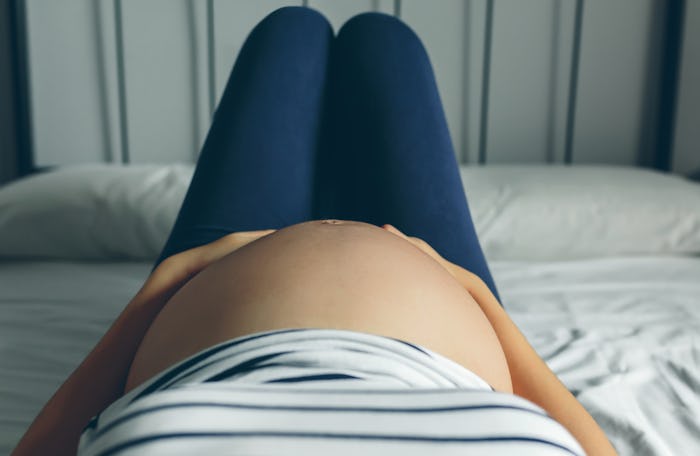Life

Science Is Awesome: Here's What Causes Contractions During Pregnancy
There's a lot of mystery involved with pregnancy. The 40 week (more or less) process involves a lot of moving parts working in unison so a healthy baby is the end result. It's quite a miraculous feat, honestly, and while some of the necessary changes involved in the whole "growing a human being" thing are obvious, others are only felt by the mom-to-be. Enter: contractions. So, what causes contractions during pregnancy? There are a two different types of contractions — Braxton Hicks and actual preterm labor contractions — so it's important to recognize where you are in your pregnancy to determine if it's worth contacting your doctor or not.
If you're pregnant it's normal to feel contractions sparingly throughout your day if, say, you've changed positions from sitting to lying down. Depending on which type of contractions you're experiencing, there are many reasons why they're actually happening. The March of Dimes explains that Braxton Hicks contractions are really just a way for your body to practice labor before it actually happens. They can be caused by a number of things, such as dehydration, sex, and even a full bladder. Parents says in order for a pregnant woman to determine if her contractions are Braxton Hicks (hormone-related) or valid preterm labor contractions, she should change what she's doing. In other words, the contractions stop, what you're feeling is not real labor. If they continue, however, time the contractions to estimate how far a part they are in order to determine when and/or if a hospital trip is necessary.
Preterm labor — contractions that occur before 37 weeks of pregnancy — has no "one" reason causing them, but there are plenty of factors that put a pregnant woman at risk for pre-term labor. The March of Dimes says a previous pregnancy that concluded with a premature labor, a pregnancy involving multiples (i.e. twins, triplets, etc.), and issues with the uterus or cervix can cause an early delivery. A long list of additional medical and lifestyle factors (such as stress, weight, alcohol or drug use) also trigger labor contractions and premature birth.
The University of California San Francisco adds that it's not normal to experience six or more contractions in an hour if you're pregnant and nowhere near your due date. In that case, you should proceed to your doctor's office or the nearest hospital.
As a reminder, Fit Pregnancy reiterates that many women feel sporadic uterine contractions when they're in the third trimester and nearing "go time." It can happen as early as the first trimester, too, as the ligaments stretch around the uterus and as you experience constipation and even gas pains. Contractions may feel like a variety of things — from slight cramping to full back and pelvic pan — and are caused by many different things, but it's important to recognize whether or not they're false or real labor contractions, to determine the best course of action.
When in doubt, and always, contact your OB-GYN and/or midwife if you have any questions or concerns. After all, that's what they're there for.